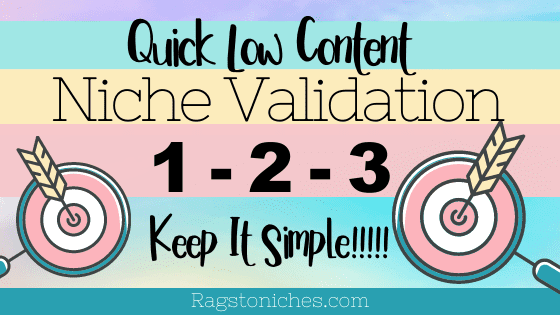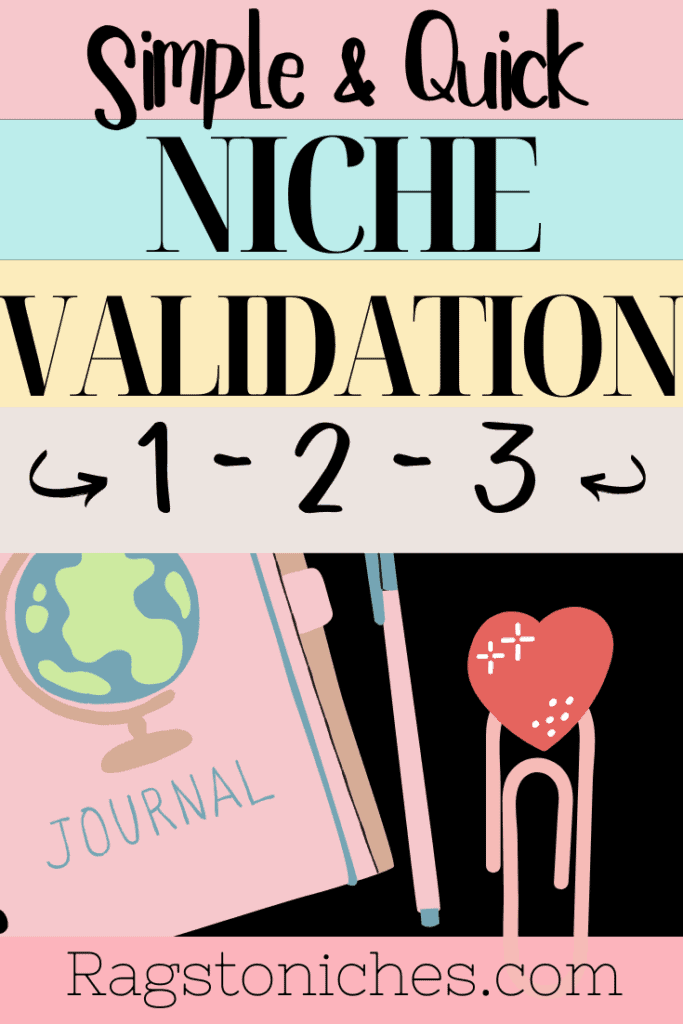
There are many complicated, long drawn out ways that you could go about validating a niche and finding keywords for Amazon KDP.
This may involve expensive tools for some, or take hours upon hours of research on Amazon to generate from scratch by yourself.
However, when you’re just starting out on KDP publishing low content…. You will probably feel completely overwhelmed by all the information you find and feel concerned about doing things the RIGHT way.
Consequently, you might end up in analyses paralyses, because you don’t want to take a lot of time and effort to create a book and it end up being a complete flop.
This is totally understandable, but it’s important that you understand and accept something first and foremost –
It is highly likely that you will have LOTS of flops.
I’m sorry to break it to you. But ask any low content publisher on KDP and ask them what percentage of their books sell.
A vast majority who are actually selling books, will probably say somewhere between 20-30% of their books sell on a regular basis.
When you add it all up, it turns out to be a LOT of books will be flops.
Does this mean you should painstakingly take hours upon hours of your time to come up with the PERFECT niche and the ideal combination of keywords that are bound to help you generate sales!?
Well…..
…. You could do that if you want.
But the thing is, even people that DO this tend to share the same experiences.
They still sell 20-30% regularly.
What has worked better for me is to put several books out in a niche I’m interested in, (with a fairly quick niche validation method) and see what happens.
If I have a sale, I will likely delve further into this niche.
I will THEN spend longer looking at keywords, looking at other books I can create, looking at how I can improve on the books I already have published.
This is is how I’ve found success with many of my books.
I try and learn from the books that are selling and I delve deeper into the niches that do sell.
Every sale you have made holds key information that will help you to generate more sales.
Not just in that particular niche, but in others as well.
For example; if your book did sell, then it’s likely your customer preferred your own cover design above others they saw.
You need to then analyse why that is and then perhaps use a similar style across other niches and see if it works there too!
Another Fact Is….
Some of the books you work the hardest and longest on…. May not sell.
This has certainly happened to me many times and I hear it a lot from other self publishers also!
I can tell you that some of the books I spent the MOST time researching and the MOST time designing, have actually been the biggest flops.
One such book finally has started to sell for me, after a fair amount of promotion using Ads and now it has generated some reviews and is selling on its own.
I’m not telling you that in that case research and design don’t matter, of course they do.
But just that, spending more time on a book won’t necessarily guarantee sales.
What has often worked better for me is to create a fairly simple interior for a book, focus hard on the cover and try and put it out there.
I may do a few like this in a niche.
If I get sales in this niche, then I will either improve the books already there, or create some additional books as well – which I then spend more time on.
So, How Do You Choose A Niche?
If you don’t know what niche to start with research wise, I highly recommend that you start with things you’re already familiar.
You can branch out later, but by creating something you at least have some vague knowledge in, or love for – you’re going to be more likely to create a design that resonates with someone.
You can figure out to start by asking yourself some basic questions such as;
- What are your interests/passions/hobbies,
- What is your occupation – or the occupations of your family and friends,
- Do you have children – what are their hobbies/passions/interests and are their books you could create to help them?
- What are your struggles – do you have any issues that you need help resolving? (weight loss/stress/procrastination/parenting & relationships/health concerns….and so on).
That is just the start, you could really go in deeper to this and you could also ask similar questions to people close to you, to get additional ideas.
Once You Have Your Idea – Head To Amazon:
So, it’s the new year as I write this and many people tend to self-reflect and self improvement in various ways is going to be a big seller during this time.
Another thing that can be popular is the idea of self-care. After what has been a difficult time for so many people; self care has become more important than ever.
After the indulgence of Christmas and New Year, we often all feel a bit run down and feel like we need to look after ourselves more!
So, we can take this idea to Amazon and see what we find.
(Always ensure you check trademarks – there may be any number of trademarked phrases using these words, so you will want to avoid those particular phrases – use https://tmsearch.uspto.gov/ to search for trademarks. You may also want to check the UK for trademarks also: https://www.gov.uk/search-for-trademark ).
By then going on to Amazon, you may find that you can niche down even further than this.
What Books Show Up?
If you’re wondering whether to search in ALL or BOOKS on Amazon when you’re researching, then read this post first.
But I do suggest you search Amazon in incognito mode.
Then I ask myself the following question about books on page 1 and 2, (for those books that are independently published).
- Is It Selling? (Ideally a BSR of 500k or lower).
- Has it been published recently? (In the last 6-12 months).
- Can I compete with this book? (Ideally not too many reviews & I am able to create something AT LEAST as good as design wise).
Frankly, if I can answer yes to these questions, it provides enough evidence for me that I have a chance to make sales in this niche.
While you cannot predict all of the keywords that every book is ranking for, you will know a fair amount simply from their title & subtitle – as these are the most important places for your selected keywords.
It then only takes a small amount of research to come up with a tonne of other relevant keywords that you can target, by using the the AMZ suggestion expander, or similar free tool.
Yes, it’s possible that those selling books recently have actually been running Ads too.
I often run Ads on new books too, so this certainly wouldn’t put me off either.
Also, you will be coming up with a variety of keywords and I always will be looking for a variety of low-medium and high competition keywords.
So some may end up using some keywords that have around a thousand or less search results….
Some will be several thousand and others may have 10,000 results or more.
This is all ok – we are going for variety here.
How Do You Choose Which Keywords Are Best?
While I tend to do fairly in depth keyword research overall, something along these lines and would typically now check in Publisher Rocket as well, because I tend to find lots more keywords on there that I hadn’t thought of.
I may also check ASINS in Helium 10 these days for additional keywords, but this is an expensive tool and not necessary for beginners, in my opinion. I have only had this in recent months!
While I do use additional tools, nothing beats research direct on the Amazon platform.
Prior to owning any tools, I would largely rely on checking competitor keywords for books that sold, (keywords in title/subtitle) in combination with the AMZ suggestion expander.
You can decide on your selection of keywords partially by using common sense, but also through choosing a variety of low/medium and high competition.
The AMZ tool, gives you some indication of this anyway, (the key phrases are under different colours depending on the competition)….

But it’s a good idea to take a look at….
- how many results come up under that keyword, (the lower the results, the lower the competition is likely to be).
- What results show up on page 1 & 2 for that keyword… Are there books making sales that have been recently published? Or is it just full of books with no BSR?
You can fairly quickly compile a list of keywords from using this method.
Finding a variety of highly relevant keywords, that vary in their competitiveness is what you’re after.
So, don’t only include highly competitive short tail keywords – use a mixture, but ensure they are as relevant to your book as possible.
You want to be sure that if someone put in that search term on Amazon, your book would be a welcome addition and something that would fit the audiences expectations in the best way.
If you’re unsure of how to input your keywords into Amazon, this is how I do it.
Simple Low Content Niche Validation – 1 – 2 -3!
When you’re looking on Amazon, just keep those three questions in mind that I mentioned earlier. This is how you can quite quickly validate a niche and figure out if there is a chance that you can get sales.
A reminder of these 3 questions to ask yourself………..
- It selling regularly ?
- Has it been published recently? (In the last 6-12 months).
- Can I compete with this book?
I used this very same method when I went into my best selling niche – I didn’t have any keyword research tools when I went into this niche and yet, it’s now home to many of my best selling books.
Including one book that has made me over 30k in royalties to date.
I talk about that in the video below.
How Do You Validate A Niche On KDP?
There are many ways that you could go about validating a niche on KDP.
Here I have provided you with just one very simple way that you could decide whether or not to go for a niche.
Far too often, I feel people over complicate this and this can make people new to KDP feel overwhelmed and some just don’t ever getting around to publishing their first book because, they are trying to implement the perfect strategy.
Well, there is no perfect strategy and the best way I have found of understanding any niche, is to start publishing in it and see what happens.
Sometimes you could start making sale in an area you really didn’t expect to find success and this is not uncommon on KDP.
Experimentation is really the golden ticket.
You can learn so much, but you do have to be willing to dive in head first and see where you end up.
How are you going about niche research? Let me know in the comments!
Pin Me For Later!

Leave a Reply